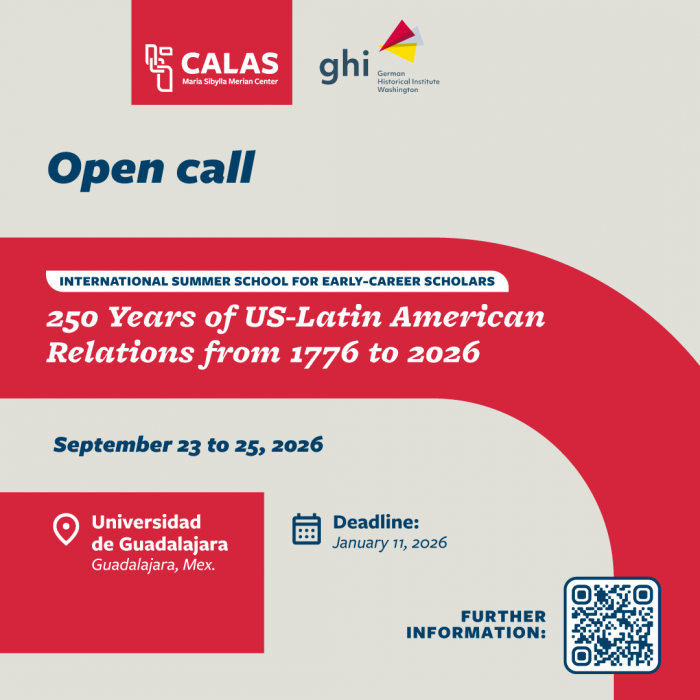In his poem Concord Hymn, Ralph Waldo Emerson commemorated the beginning of the American Revolution, describing the first clashes between Patriot militias and British troops as “the shot heard round the world.” The proclaimed transnational impact of this world-historical event held particularly true for Latin America, where the 1776 Declaration of Independence was perceived as a guiding example by anti-colonial leaders such as Simón Bolívar, who, in his “Letter from Jamaica” (1815), celebrated the successful revolution as a liberation “from the shackles of oppression”, arguing that “the United States seem to be destined by Providence to give liberty to America.” In the same vein, the Argentinean general José de San Martín stated in 1822: “The independence of North America was the first blow dealt to European despotism in the New World; it showed our people that the struggle was neither in vain nor impossible.”
As we are approaching 2026, the semiquincentennial of the Declaration of Independence, we reflect on two-and-a-half centuries in which relationships between the United States and Latin America have undergone profound transformations. Ties initially shaped by mutual admiration and solidarity became marked by power asymmetries, economic exploitation, U.S. support of military coups and right-wing dictatorships in the Cold War context, and the emergence of anti-(US)-imperialism as the common denominator of popular movements in Latin America as the U.S. rose from a young republic to a global world power. At the same time, an increasing variety of actors shaped US-Latin American relations as transnational cooperation and the exchange of ideas across the Americas occurred in many fields, including economic, environmental, political, and cultural affairs. Latin Americans, both inside and outside of government, assumed leadership roles in inter-American forums, and they used these forums to pursue their own goals. Later in the twentieth century, South-North migrations transformed the demographics of the United States, with Latinos now constituting the largest minority in the country. Completing the panorama of multidirectional flows between the United States and Latin America, cross-border dialogues between counterhegemonic movements and popular cultures have demonstrated that relationships between both regions are far more complex than one-dimensional narratives of domination and resistance, center and periphery, might suggest.
In the current political moment, the entanglements between the United States and Latin America are more apparent than ever. We invite early career researchers from the humanities (including the field of history) and social sciences to submit proposals addressing the question of how the relationship between Latin America and the United States has changed over time. We deliberately adopt a broad, hemispheric, and transregional perspective, to identify new historical trajectories and repercussions of U.S. foreign policy across different Latin American contexts. And we embrace a multidirectional perspective that asks, also, how Latin Americans have reshaped U.S. society as geopolitical conditions have changed over time. We welcome research-based papers by young historians and scholars in the social sciences and humanities, clearly contextualized in relation to U.S.-Latin American relations, on topics such as:
- US foreign policy and its impacts on/in Latin America
- Latin American migrations, and their social and political impacts on the U.S.
- Counter-hegemonic movements in Latin America and the United States
- U.S.-Latin American relations as reflected in culture, art, literature, and music
- Discourses and practices around equality, plurality, rights, and democracy
- Contemporary Afro-diasporic, Indigenous, and feminist movements
In a joint venture between CALAS (Headquarters Mexico) and the Pacific Office of the GHI Washington at UC Berkeley, the *International Summer School / Congreso Internacional de Jóvenes Investigadores* will take place at CALAS Headquarters Guadalajara from September 23 to 25, 2026. The event will be structured around three formats of exchange among participants and with the broader public: panels, workshops, and spaces for artistic exhibitions or interventions.
The panels will be organized thematically and will feature scholarly paper presentations by 4–5 participants. Accepted panelists will be asked to submit and circulate their papers in advance to ensure high-quality contributions and to foster engaged dialogue and debate among all summer school participants.
The workshops will be coordinated by invited scholars and practitioners, focusing on how to conduct qualitative research in the social sciences within the current landscape of contested theories and methodologies. Workshops aim to provide participants with constructive feedback on their individual projects as well as broader reflections on academic trajectories.
As part of the conference’s parallel programming, the artistic exhibition/intervention spaces will be open to proposals that, through diverse visual and performing arts, engage critically with the central themes of the conference. Applicants interested in participating in the artistic exhibition/intervention spaces should submit a project description, an outline of the theme addressed, its relation to the conference topics, and the spatial or technological requirements necessary for its presentation.
Event and Application Guidelines:
- Venue: Guadalajara, Mexico
- Date: September 23 to 25, 2026
- Target audience: Young researchers in the social sciences humanities (master's, doctoral, and early postdoctoral researchers)
-Languages: Spanish and English.
- Application: Complete the online application form with the title and abstract of the proposal (300–400 words) and a short academic cv, including studies, publications/conferences, and/or relevant activities related to the proposal.
- Deadline for proposals: January 11, 2026
- Notification: An academic committee will select the successful applications based on criteria of excellence. Applicants will be notified before February 15, 2026, regarding the evaluation of their submissions.
- Funding: CALAS and the GHI will cover accommodation and meals. In addition, there will be a limited budget for travel expenses.
Convenors: Melissa Amezcua Yepiz (University of Guadalajara), Matti Steinitz (Bielefeld University), Wilfried Raussert (Director CALAS), Amy Kerner (Pacific Office of the German Historical Institute Washington at UC Berkeley)
Contact for further information: merian.calas@gmail.com


